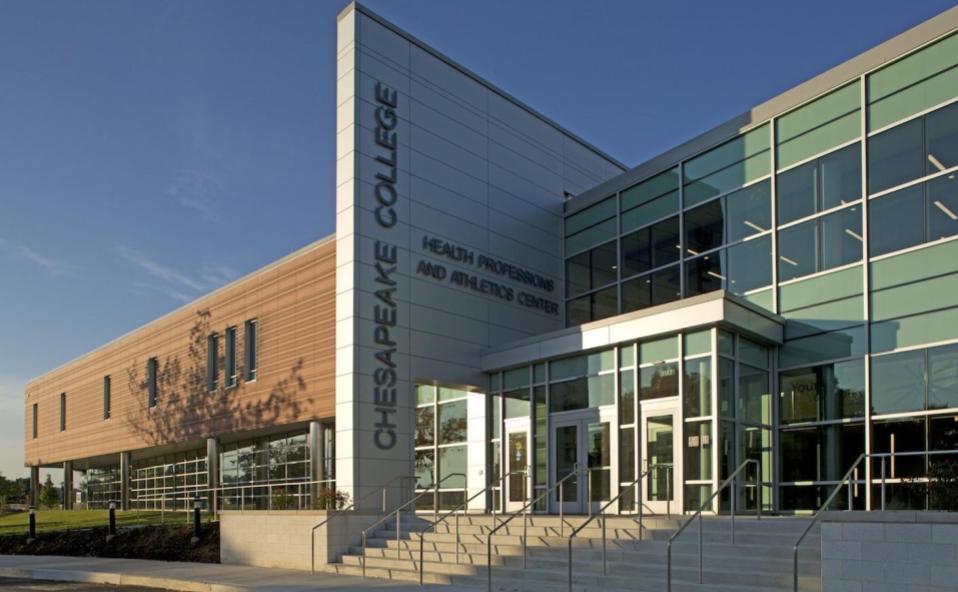Like every organization and individual in Maryland, Chesapeake College has had to adjust to the new normal during the COVID-19 pandemic – and quickly.

Larry Savage and Michael Holt of the Maryland Department of Health, with Associate Professor Jon Longest, maintain social distance as they load the college’s three ventilators on a delivery truck. Chesapeake is loaning the ventilators — used for training in the health professions programs — to the state for use during the COVID-19 pandemic response in Maryland.
Just a month ago, Chesapeake’s students and faculty were looking forward to a week-long spring break. Since that time, the college transitioned 300 class sections to online delivery and moved nearly all operations off campus. More academic activities are transitioning to the online format in the coming weeks.
We recognize that these events have brought significant disruption to our region, and impacted our students, and our community at large, in ways we could not have anticipated,” said President Cliff Coppersmith, who heads one of the Mid-Shore’s largest employers. “I’m very proud of our faculty, staff and students. Things are going well at this point as they’ve worked hard to continue learning, teaching and supporting our operations.”
Chesapeake’s spring break began the weekend of March 14 and was extended an extra week to prepare for remote operations. Faculty and staff used those weeks to transfer to remote instruction and close campus to the public.
“It has been heartening to see the Chesapeake College community come together in response to COVID- 19,” said Dave Harper, vice president for academic and workforce programs. “Faculty and staff have been flexible, creative, and graceful in moving our programs and services online so we can keep serving the region. Students are plugged-in and patient, and we are grateful that education can be one part of their lives that brings a sense of normalcy.”
Chesapeake’s leaders were aware that moving instruction online could pose challenges to some students. Technology issues, internet access and a lack of online learning experience were all concerns. Both the Academic Support Center and the IT division at Chesapeake are working to help the new online learners.
In addition to assistance on the college’s website, tutoring and tech support are also offered remotely for Chesapeake’s students.
Director of Financial Aid Princess Williams and her staff have been assisting students with financial and technology challenges brought on by the pandemic’s impact.
To aid students who do not have easy access to WiFi, Chesapeake offers parking lot access to WiFi at both the Cambridge Center and Wye Mills Campus. The college also provides links to community resources such a mental health counseling and food donations. Since students do not currently have access to the Corner of Care, Chesapeake’s on-campus food pantry, the college is assisting through the Student Emergency Fund.
With the expected federal funding through the Higher Education Relief Act, Chesapeake will be able to do even more to help provide educational access to more students and meet the changing needs of the community.
The Chesapeake College Foundation is dedicated to assisting Chesapeake students. Board members recognize additional challenges for students as they deal with fall-out from COVID 19.
“The Foundation’s robust scholarship program, which is made possible by generous community donors, has ensured that students have the financial support they need to complete the spring semester. It will also provide important scholarships in the fall, so that students who may have even greater need can continue toward their educational goals and improved employment prospects right here in our community,” said Executive Director Elizabeth Devlin Hackett.
In addition to students, Chesapeake is also supporting the community at large. Chesapeake loaned its three ventilators to the Maryland Department of Health to be used in the state response to COVID 19. The ventilators are used for student instruction in Chesapeake’s health professions programs.
The Queen Anne’s County Health Department continues to offer drive-up COVID 19 testing three days per week on the Wye Mills Campus to area residents who have doctors’ orders for testing.
Chesapeake also partners with the Workforce Investment Board to offer subsidized training for displaced workers and the unemployed, to help them get back on their feet.
The college actively engages with the Small Business Development Center as well as local chambers of commerce and economic development councils to provide business recovery support and to ensure classes and programs align with local business, industry, and employer needs.
Registration for summer session is now open. Admissions, advising, registration and business office functions are all available remotely at www.chesapeake.edu.



Write a Letter to the Editor on this Article
We encourage readers to offer their point of view on this article by submitting the following form. Editing is sometimes necessary and is done at the discretion of the editorial staff.